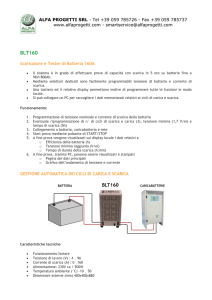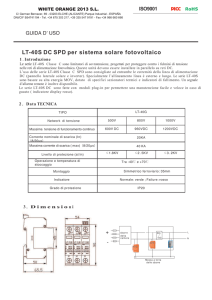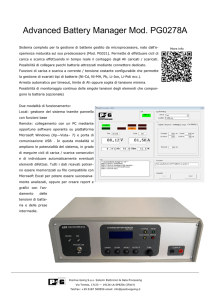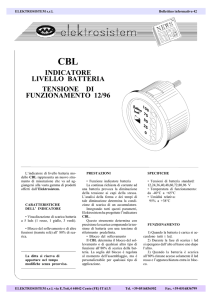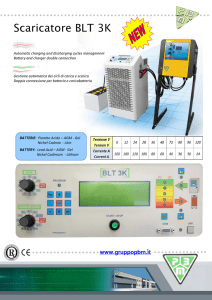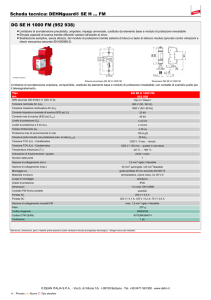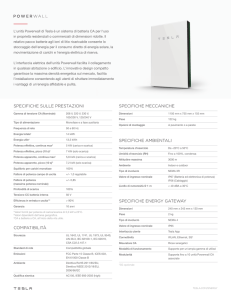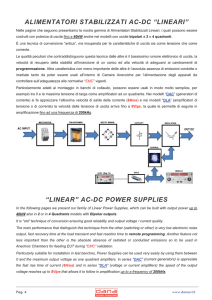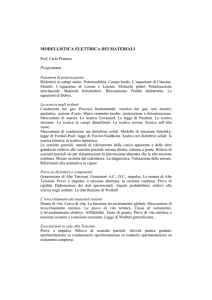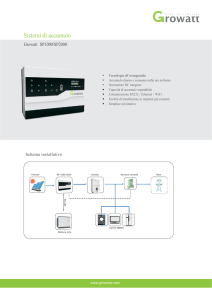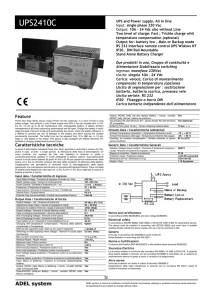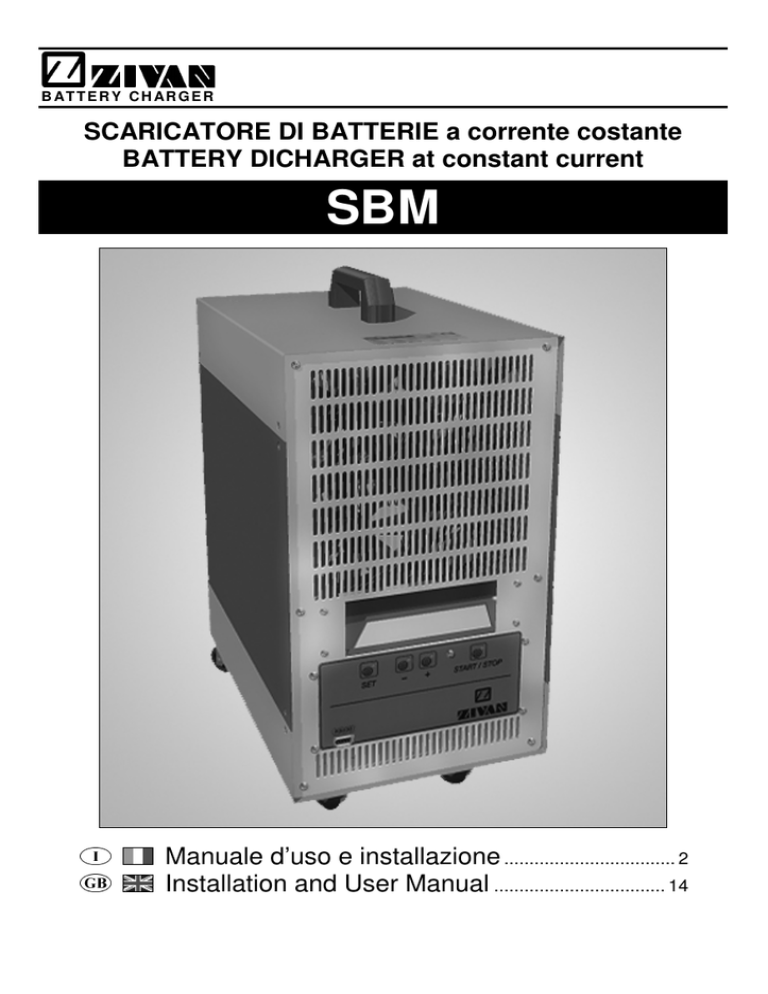
B AT T E R Y C H AR G E R
SCARICATORE DI BATTERIE a corrente costante
BATTERY DICHARGER at constant current
SBM
Manuale d’uso e installazione .................................. 2
Installation and User Manual .................................. 14
Italiano
SCARICATORE DI BATTERIE a corrente costante
ATTENZIONE Non rimuovere
il coperchio: pericolo di scosse elettriche.
Rivolgersi solo a personale autorizzato.
Prima dell’utilizzo, leggere attentamente
il libretto di istruzioni.
Spiegazione dei simboli grafici.
Il simbolo di freccia a forma di fulmine all’interno di un triangolo equilatero avverte l’utente
della presenza di “tensione pericolosa” non isolata dentro il contenitore del prodotto; questa
può essere di ampiezza sufficientemente grande per costituire un rischio di scosse
elettriche per le persone.
Il punto esclamativo all’interno di un triangolo equilatero avverte l’utente della presenza di
importanti istruzioni d’uso e manutenzione (servizio) contenute nella documentazione
allegata al prodotto.
Ci congratuliamo con Lei per aver scelto un prodotto di qualità, concepito per
rispondere alle più rigorose esigenze.
Questa apparecchiatura è coperta da garanzia.
Il relativo certificato di garanzia si trova allegato al libretto di istruzioni.
Se dovesse mancare, richiedetelo al vostro rivenditore.
Per futuri riferimenti, riportate nell’apposito spazio il numero di matricola:
Serial No.______________________
Le informazioni contenute in questo manuale sono di proprietà della ZIVAN S.r.l.
che si riserva di fornirle ad uso esclusivo dei propri clienti. Nessun altro uso è
permesso senza un’autorizzazione scritta emessa dalla ZIVAN S.r.l..
La ZIVAN S.r.l. non risponde delle possibili inesattezze, imputabili a errori di stampa
o di trascrizione, contenute nel presente manuale. Si riserva di apportare ai propri
prodotti quelle modifiche che ritenesse necessarie o utili, anche nell’interesse
dell’utenza, senza pregiudicare le caratteristiche essenziali di funzionalità e
sicurezza.
2
D01470-03
SCARICATORE DI BATTERIE a corrente costante
Italiano
Installazione e istruzioni di sicurezza
Lo scaricatore di batterie a corrente costante ZIVAN è stato progettato per garantire sicurezza e
prestazioni affidabili. Tuttavia, onde evitare danni alla propria persona e allo scaricatore, si raccomanda di
osservare le seguenti precauzioni di base:
•
Leggere attentamente le istruzioni sull’installazione contenute in questo manuale. Per futuri
riferimenti, riporre il manuale in un posto sicuro.
•
Posizionare lo scaricatore su una superficie stabile e piana. Nel caso di superficie sollevata da terra
assicurarsi che lo scaricatore sia saldamente bloccato.
•
Per evitare il surriscaldamento, accertarsi che tutte le aperture non siano ostruite. Non posizionare lo
scaricatore nei pressi di fonti di calore. Assicurarsi che lo spazio libero intorno allo scaricatore sia
sufficiente per garantire un’adeguata ventilazione.
•
Assicurarsi che l’area limitrofa al caricabatteria sia tenuta sgombra da materiali facilmente
infiammabili.
•
Proteggere lo scaricatore da eventuali spruzzi d’acqua e non versare liquidi al suo interno.
•
Verificare che il tipo di alimentazione a disposizione corrisponda al voltaggio previsto e indicato nella
targhetta dello scaricatore. In caso di dubbio, consultare il proprio rivenditore o la società elettrica
locale.
•
Come dispositivo di sicurezza, lo scaricatore dispone di una spina a tre poli con messa a terra, che
può essere inserita soltanto in una presa con messa a terra. Nel caso in cui non sia possibile inserire
la spina nella presa, è molto probabile che la presa a disposizione sia di un tipo vecchio e non a terra.
In tal caso, contattare un elettricista per far sostituire la presa. Si raccomanda di non usare un
adattatore per risolvere il problema della messa a terra.
•
Evitare che il cavo di alimentazione sia in una posizione di ingombro. Nel caso in cui il cavo diventi
logoro o subisca danni, sostituirlo immediatamente.
•
Verificare che la tensione nominale della batteria da scaricare sia inferiore o uguale a quella indicata
nella targhetta dello scaricatore.
•
Non allungare i cavi di potenza perché ciò comporterebbe un errore di lettura della tensione che
appare sul display. Se proprio dovesse essere indispensabile, allungare i cavi con spezzoni di
lunghezza minima e di sezione adeguata per minimizzare la caduta di tensione aggiuntiva (per una
eventuale compensazione vedere istruzioni all’interno del presente manuale).
•
Non tentare di effettuare riparazioni sullo scaricatore. L’apertura del coperchio potrebbe esporvi al
rischio di scosse elettriche.
•
Nell’eventualità che lo scaricatore non funzioni in modo corretto o che sia danneggiato, scollegarlo
immediatamente dalla presa di corrente e dalla presa di batteria e contattare il rivenditore.
N.B. Le figure riportate in questo manuale sono relative al modello 80V-150A.
D01470-03
3
Italiano
SCARICATORE DI BATTERIE a corrente costante
Introduzione
Lo scaricatore di batterie a corrente costante ZIVAN è un’apparecchiatura portatile indispensabile per
controllare lo stato di efficienza di una batteria, sia questa nuova o usata.
È stato progettato per poter sostituire in modo estremamente vantaggioso i classici e voluminosi blocchi
di resistori di potenza conservandone l’intrinseca affidabilità e offrendo in più la versatilità di
un’apparecchiatura elettronica.
I tipi di batterie presenti sul mercato si sono moltiplicati negli ultimi anni e ogni tipo di batteria ha le proprie
caratteristiche di carica e scarica.
Tuttavia, per l’importanza che oggi riveste la trazione elettrica che consente sia un più razionale utilizzo
delle risorse energetiche sia un minore disturbo dell’equilibrio ecologico, è opportuno fornire alcune
spiegazioni per quanto riguarda le batterie trazione.
Per batterie trazione si intendono tutti i tipi che sono normalmente usati come principale fonte di energia
per la propulsione di veicoli industriali.
L’accumulatore al piombo è un dispositivo elettrochimico che accumula, sotto forma di energia chimica,
l’energia elettrica fornitagli durante la carica per poterla erogare, di nuovo come energia elettrica, durante
la scarica.
Una batteria viene caratterizzata da due grandezze: tensione e capacità.
Tensione:
Ogni elemento al piombo ha una tensione nominale di 2 Volt (indipendentemente dalle sue dimensioni).
Per avere tensioni superiori si collegano in serie più elementi venendo così a costituire una “BATTERIA”
di elementi.
La tensione nominale di una batteria si ottiene moltiplicando per 2 il numero di elementi in serie fra loro.
La tensione a circuito aperto, di un elemento a riposo, dipende dalla densità dell’elettrolito:
Vo = ρ + 0,84
dove:
Vo = tensione dell’elemento in V (Volt)
ρ = densità dell’elettrolito in kg/dm³
Esempio: con densità 1,26 kg/dm³ si avrà Vo = 2,1V.
Durante la scarica diminuisce la concentrazione di acido solforico e di conseguenza diminuisce la densità
dell’elettrolito che diventa quindi un indicatore di stato di carica.
Nello stato di piena carica, la tensione di un singolo elemento è infatti compresa fra 2,07V e 2,12V, a
seconda della temperatura e della densità dell’elettrolito. Il processo di scarica determina una caduta del
valore della tensione, più o meno sensibile a seconda del regime di scarica, che diventa rapida quando
viene raggiunto il valore di tensione di fine scarica, oltre il quale non è consigliabile procedere.
Capacità:
È la quantità di elettricità che gli accumulatori possono fornire a un circuito esterno prima che la tensione
scenda al di sotto del valore limite finale e si ottiene moltiplicando l’intensità della corrente di scarica I per
il tempo di scarica t espresso in ore:
C=I×t
dove:
C = capacità in Ah (amperora)
I = corrente di scarica in A (ampere)
t = tempo di scarica in h (ore)
La capacità delle batterie per trazione viene normalmente riferita al regime di scarica di 5 ore (C5) in
quanto si ritiene che durante una giornata lavorativa di 8 ore l’effettivo sfruttamento della batteria sia
paragonabile ad una scarica costante al regime di 5 ore.
In questo caso si hanno le relazioni:
C5 = Inom × 5h
;
Inom =
C5
5h
che definiscono la corrente nominale di una batteria trazione.
4
D01470-03
SCARICATORE DI BATTERIE a corrente costante
Italiano
Scarica di una batteria
Per controllare lo stato di carica delle batterie esistono due metodi:
1) Metodo della misurazione della densità dell’elettrolito.
La densità dell’elettrolito si misura con uno strumento chiamato densimetro.
Questa misura va eseguita con la massima cura e ha l’inconveniente di dipendere dalla temperatura.
Per una temperatura dell’elettrolito pari a 30 °C si ha :
densità di circa 1,26 kg/dm³ (30 °Bé): batteria carica
densità compresa tra 1,26 kg/dm³ (30 °Bé) e 1,20 kg/dm³ (24 °Bé): batteria parzialmente scarica
densità inferiore a 1,14 kg/dm³ (18 °Bé): batteria completamente scarica
2) Metodo della misurazione della tensione durante la scarica.
I valori di tensione minimi del singolo elemento che possono essere raggiunti durante la scarica
dipendono dalla corrente di scarica secondo questa relazione:
Vstop = 1,7385 − 0,0385 ×
I
Inom
dove
Inom = corrente nominale =
C5
5h
I = corrente di scarica
Pertanto scaricando con una intensità di corrente pari al regime di 5 ore (cioè I = Inom) la tensione alla
quale si deve interrompere la scarica è:
Vstop = 1,7 Volt/elemento
Principio di funzionamento
Lo scaricatore di batterie ZIVAN utilizza il metodo della misurazione della tensione durante la scarica.
Tale metodo richiede, per definizione, di scaricare la batteria con corrente costante fino al raggiungimento
della tensione limite di scarica Vstop.
La proprietà di mantenere costante la corrente scaricata dalla batteria può essere ottenuta soltanto da un
carico elettronico che varia la propria resistenza al variare della tensione.
In funzione della tensione di batteria applicata e della corrente di scarica richiesta, lo scaricatore
seleziona automaticamente diversi resistori e, con tecnologia MOSFET a 20kHz, effettua, attraverso una
regolazione del PWM (Pulse Width Modulation), la variazione di carico necessaria per mantenere
costante la corrente al variare della tensione di batteria.
L’elevata frequenza del controllo elettronico permette di assorbire dalla batteria una corrente
perfettamente continua, senza alcuna ondulazione (ripple).
Attraverso il timer con arresto automatico è possibile fissare la durata della scarica. Questo permette di
effettuare scariche parziali e così aumentare la flessibilità dell’apparecchiatura.
Schema a Blocchi
+
L
RECTIFIER
AND
FILTER
E
N
CONTROL
LOGIC
RS232
PWM
M
-
KEYBOARD
VENTILATION
DISPLAY
D01470-03
POWER
STAGE
5
Italiano
SCARICATORE DI BATTERIE a corrente costante
Istruzioni d’uso
1) Accensione dello scaricatore
Collegare l’apparecchiatura alla presa di corrente e azionare l'interruttore posto nel pannello posteriore.
Sul display comparirà per qualche istante:
Nel caso di utilizzo del modello a doppia unità:
a) Accertarsi che le due unità siano spente.
b) Collegare il cavo di interconnessione alle prese di interfaccia parallela.
c) Accendere l’unità secondaria (quella senza display).
d) Accendere l’unità principale.
Se questa procedura è rispettata, il display indicherà una corrente di targa doppia rispetto a quella
dell’unità singola:
Occorre fare molta attenzione ad accendere prima l’unità secondaria e poi l’unità principale, poiché in
caso contrario l’apparecchiatura scaricherebbe il doppio della corrente impostata e indicata sul display.
Se la corrente da scaricare è compresa nel campo di utilizzo dell’unità principale non è necessario
utilizzare anche l’unità secondaria.
Dopo la presentazione il display indicherà di collegare la batteria:
2) Collegamento della batteria
Collegare la batteria rispettando le polarità (in caso di inversione il display avviserà dell’errore).
Nel caso si voglia determinarne la capacità, accertarsi che la batteria sia stata caricata completamente.
3) Impostazione dei parametri
In questa fase, caratterizzata dalla scritta SET che compare sul display, si possono impostare parametri
di scarica I, Vstop e T, mentre Vbat riporta il valore di tensione letta al momento del collegamento della
batteria.
Selezionare il parametro di scarica lampeggiante con il pulsante SET (mediante il quale si passa in
rotazione da un parametro all’altro) e impostare il valore desiderato mediante i due pulsanti - e +.
6
D01470-03
SCARICATORE DI BATTERIE a corrente costante
In ogni condizione di funzionamento, i LED accesi indicano quali sono i tasti attivi.
Italiano
I: corrente di scarica
Si imposta automaticamente al valore minimo scaricabile (1 o 2 ampere a seconda del modello) ed è
perciò necessario portarla al valore desiderato.
Normalmente (scarica costante al regime di 5 ore) questo valore si ottiene dividendo per 5 la capacità
della batteria espressa in C5. Esempio: C = 400Ah, I = 400/5 = 80A.
Vstop: Tensione di stop della scarica.
Per ragioni di sicurezza si imposta automaticamente a circa l’80% di Vbat ed è perciò necessario
cambiarla se non corrispondesse al valore desiderato.
Normalmente (scarica costante al regime di 5 ore) questo valore è 1,7 Volt/elemento.
Tabella dei valori di “I”
C5 (Ah)
30
45
50
60
80
100
120
180
200
240
300
360
380
400
420
480
500
540
600
700
750
I (A)
6
9
10
12
16
20
24
36
40
48
60
72
76
80
84
96
100
108
120
140
150
Tabella dei valori di “Vstop”
Vnom (V)
6
12
24
36
40
48
60
72
80
84
96
108
120
132
144
156
168
180
192
204
216
Vstop (V)
5,1
10,2
20,4
30,6
34
40,8
51
61,2
68
71,4
81,6
91,8
102
112,2
122,4
132,6
142,8
153
163,2
173,4
183,6
T: durata della scarica (arresto automatico)
Si imposta automaticamente al valore massimo pari a 9h e 59m ed è perciò necessario cambiarlo nel
caso si desideri una scarica parziale con arresto a tempo.
La funzione di timer con arresto automatico può essere disabilitata impostando il valore 0h e 00m.
Questa operazione si rende necessaria qualora si preveda un utilizzo dell’apparecchiatura per più di 10
ore (scarica lenta).
Normalmente (scarica costante al regime di 5 ore) non occorre impostare il tempo ed è sufficiente
lasciare il valore impostato automaticamente a 9h e 59m.
4) Scarica della batteria
Dare inizio alla scarica premendo il pulsante START/STOP.
In questa fase il display mostra quanto segue:
Vbat: indica la tensione di batteria; è un voltmetro a tutti gli effetti.
Vstop: indica la tensione di interruzione della scarica.
I: indica la corrente di scarica.
D01470-03
7
Italiano
SCARICATORE DI BATTERIE a corrente costante
Ah: indica gli amperora scaricati.
T: indica il tempo trascorso dall’inizio della scarica (quando il timer è disabilitato, al raggiungimento delle
10 ore il conteggio ricomincerà da 0h 00m).
5) Sospensione della scarica
In qualunque istante è possibile arrestare temporaneamente la scarica premendo il tasto START/STOP;
premendolo nuovamente si rientra nella fase di impostazione dei parametri.
In questa fase si può decidere se modificare i parametri di scarica.
Premendo ancora il tasto START/STOP si fa ripartire la scarica dal punto in cui era stata interrotta.
6) Arresto della scarica
L’arresto della scarica può avvenire per due condizioni: quando la tensione di batteria raggiunge la
tensione di stop oppure quando il tempo trascorso raggiunge il tempo impostato.
La condizione che ha portato all’arresto della scarica è indicata dal lampeggio del parametro
corrispondente.
È da notare che interrompendo la scarica la tensione della batteria risale “naturalmente” pertanto è
normale che i valori di Vbat e Vstop non coincidano al termine della scarica nemmeno quando questa è
avvenuta per raggiungimento di Vstop.
7) Analisi dei risultati
Nel caso di scarica costante al regime di 5 ore l’analisi dei risultati è molto semplice:
Al termine della scarica (che normalmente avviene con Vstop lampeggiante) basta confrontare il valore
degli amperora scaricati con il valore di targa di capacità della batteria.
Se il valore Ah è molto inferiore a quello di targa occorrerà fare una analisi dettagliata dei singoli elementi
della batteria in esame per scoprire quali di essi si trovano in cattive condizioni.
Se il valore Ah è prossimo a quello di targa significa che la batteria in esame è, nel suo complesso, in
buone condizioni.
Allarmi e messaggi di errore
È stata collegata una batteria con polarità invertita.
È stata collegata una batteria con tensione superiore alla
massima accettata dall’apparecchio.
È intervenuta la protezione termica interna a causa di un
eccessivo calore.
Vi è un assorbimento di corrente inaspettato dalla sezione
elettronica oppure un disallineamento delle tarature
impostate in fabbrica.
Impossibilità di scaricare il valore impostato oppure anomalia
del banco condensatori oppure teleruttori con problemi di
chiusura (contatti sporchi).
Nel caso di modello a doppia unità i messaggi d’errore saranno accompagnati dalle scritte:
MODULO 0 se l’anomalia è avvenuta nell’unità principale
(con display)
MODULO 1 se l’anomalia è avvenuta nell’unità secondaria
(senza display).
8
D01470-03
SCARICATORE DI BATTERIE a corrente costante
Italiano
Manutenzione
Pulizia
Nel caso di utilizzo in ambienti particolarmente polverosi si consiglia di pulire periodicamente
l’apparecchio con aria compressa in quanto i ventilatori necessari al funzionamento aspirano una
notevole quantità di sporcizia.
Taratura della corrente
Nel caso di notevoli differenze tra il valore indicato dal display e quello letto con un amperometro esterno,
è possibile regolare la corrente di scarica tramite 2 trimmer situati sulla scheda base.
Per eseguire correttamente la procedura di riallineamento elenchiamo di seguito, passo passo, le
operazioni da eseguire:
1.
2.
3.
4.
5.
Accendere l’apparecchiatura per almeno 15 minuti (senza attivare la scarica).
Collegare una batteria che possa sopportare la massima corrente scaricabile dallo scaricatore.
Predisporre un preciso amperometro per misurare la corrente esternamente.
Attivare la scarica con la minima corrente scaricabile dallo scaricatore.
Agire sul trimmer “OFFSET” (TM1) per avere il valore indicato dall’amperometro esterno uguale o il
più vicino possibile a quello indicato sul display dello scaricatore.
6. Attivare la scarica con la massima corrente scaricabile dallo scaricatore.
7. Agire sul trimmer “IMAX” (TM2) per avere il
valore indicato dall’amperometro esterno uguale
o il più vicino possibile a quello indicato sul
display dello scaricatore.
8. Verificare a livelli di corrente intermedi la
ZIVAN ZR51
corrispondenza dei valori indicati dagli
strumenti.
9. Ripetere le operazioni dal punto 4 più volte sino
ad ottenere un perfetto allineamento finale.
C29
U1
C30
C31
C32
R30
R31
R39
R40
TM2
TM1
C28
HALL
R32
R33
R34
R35
R36
R37
R38
OFFSET
I MAX
Nel caso del modello a doppia unità:
C33
C26
R27
R28
R29
C27
1. Allineare l’unità principale separatamente.
TP
NEGATIVO
TP
2. Collegare l’unità secondaria e ripetere le
operazioni di allineamento agendo unicamente
sui trimmer dell’unità secondaria.
Compensazione della tensione
Nel caso di una variazione di lunghezza dei cavi di potenza è possibile correggere la lettura di tensione
tramite 2 piccoli interruttori situati sulla scheda di controllo.
Con questi interruttori si possono selezionare 4 tipi di compensazione:
ON
ON
ON
1. nessuna compensazione
ON
2. compensazione “piccola” (impostazione di fabbrica)
1
2
1
1
2
2
1
2
3
1
2
4
3. compensazione “media”
4. compensazione “grande”
Tale compensazione va verificata sperimentalmente in quanto dipende molto da come si effettua la
connessione alla batteria (morsetti, coccodrilli, capicorda, ecc.).
D01470-03
9
Italiano
SCARICATORE DI BATTERIE a corrente costante
Caratteristiche tecniche
Morsetti di Alimentazione
• Tensione di Ingresso: 230 VAC
• Frequenza di Ingresso: 50-60 Hz
• Potenza assorbita: 150W
• Fusibile di Ingresso: 0,8A
Morsetti di Batteria
• Tensione minima di funzionamento: 3V
• Corrente minima di funzionamento: 1A (2A per il modello a doppia unità)
• Tolleranza valori di lettura: ± 1,5%
Generali
• Ventilazione: forzata
• Frequenza di lavoro: 20kHz
• Dimensioni (una unità): 465×265×400 mm
• Peso (una unità): 26kg
Protezioni e sicurezza
• Autodiagnostica residente
• Protezione termica
• Protezione contro l’inversione di polarità
• Protezione contro tensioni superiori alle massime consentite
Area di funzionamento (singola unità)
1000
Corrente di scarica (A)
1
100
7
80-150
120-100
160-75
10
1
1
10
10
100
Tensione di batteria (V)
1000
D01470-03
SCARICATORE DI BATTERIE a corrente costante
Italiano
Acquisizione delle scariche tramite PC
Mediante l’interfaccia RS232 è possibile comandare a distanza lo scaricatore tramite PC.
È possibile, inoltre, memorizzare e stampare le curve di scarica e tutti i parametri relativi permettendo
così di documentare le prove eseguite.
Il software per la gestione dei dati è disponibile, come optional, su esplicita richiesta del cliente.
I comandi e le segnalazioni date direttamente dallo scaricatore hanno la stessa efficacia dei comandi dati
dalla tastiera del PC, in modo che la macchina possa funzionare indifferentemente con e senza PC.
La descrizione che segue illustra il funzionamento dell’applicazione a prescindere dai comandi standard
di MS Windows™ e dall'uso delle sue finestre.
REQUISITI MINIMI DEL SISTEMA
Per utilizzare il programma è necessario un IBM PC™ compatibile con: processore 386 (o equivalente);
4MB RAM; Drive per floppy 1,44 MB; Monitor e adattatore video VGA; Software MS Windows™ 3.1.
INSTALLAZIONE DEL PROGRAMMA
1. Avviare MS Windows™.
2. Copiare il dischetto su disco rigido in una directory chiamata SBM (c:\sbm).
3. Entrare nel gruppo di programmi Applicazioni.
4. Scegliere Nuovo dal menù File e dare OK.
5. Nella riga di comando digitare c:\sbm\sbmpc∗
∗∗∗.exe <parametro> e dare OK dove parametro è
uguale a com1 o com2 a seconda di dove si collega il connettore della RS232.
Esempio: c:\sbm\sbmpci44.exe com1.
PRINCIPALI FUNZIONI
• configurare lo scaricatore
• avviare e fermare una scarica
• acquisire i dati della scarica in corso
• visualizzare la configurazione dello scaricatore
• visualizzare la scarica in corso in automatico
• visualizzare le scariche precedenti in archivio
• salvare su file i dati di scarica in automatico
• salvare su file formato testo i dati acquisiti
• stampare i grafici delle scariche
• stampare la tabella dei dati acquisiti in scarica
• inserire dati specifici della batteria in prova
MENÙ "File"
Apri: consente di scegliere tra le scariche in archivio quella da visualizzare (attivo solo a scaricatore
scollegato).
Salva: permette di salvare la scarica con un nome a piacere o con un nome predefinito (SCA∗.SBM).
Nuovo: permette di ripartire da capo con una nuova scarica.
Esporta CSV: converte in formato testo ∗.CSV i dati acquisiti (da utilizzare, per esempio, con MS Excel).
Stampa Grafico B/N: lancia la stampa del grafico visualizzato in bianco e nero.
Stampa Grafico Colori: lancia la stampa del grafico visualizzato a colori.
Stampa Tabella: lancia la stampa dei dati acquisiti in forma tabellare.
Configura Stampante: introduce alle opzioni per configurare le stampe e la stampante.
Esci: conclude la sessione di lavoro.
D01470-03
11
Italiano
SCARICATORE DI BATTERIE a corrente costante
MENÙ "Vista"
Viene visualizzata una tabella con i valori configurati per lo scaricatore collegato e il nome predefinito del
file in cui sarà salvata la scarica in automatico.
MENÙ "Dati di prova"
Viene visualizzata una tabella da compilare con i dati della batteria e dell’impianto che si sta provando
insieme ad alcune caselle per identificare l’operatore. Questi dati saranno riportati in stampa.
GRAFICO
Il grafico visualizza gli andamenti di tensione (colore blu), corrente (colore rosso) e amperora (colore
verde) in funzione del tempo.
La riga costante orizzontale indica la tensione programmata per la fine della scarica (Vstop).
12
D01470-03
SCARICATORE DI BATTERIE a corrente costante
Italiano
CURSORE E VALORI NUMERICI
La barra di scorrimento delimita lo spazio per il cursore, rappresentato dalla linea verticale grigia nel
grafico. Il cursore fa da puntatore per visualizzare nei riquadri sottostanti i valori numerici di quell'ascissa
del grafico. Il cursore si può spostare con il mouse trascinandolo o premendo sulle frecce laterali, ma si
può muovere in modo più preciso con le frecce sulla tastiera. In alternativa con il mouse si può puntare
una zona del grafico dove automaticamente il cursore si posiziona. La scala dei tempi viene
automaticamente adattata, in funzione delle acquisizioni, allo schermo utile.
COMANDI E MESSAGGI
Lo spazio orizzontale più basso è riservato ai comandi di START, STOP e allo stato operativo.
START: premendo con il mouse il tasto di start viene visualizzata una tabella con i dati di configurazione
della prossima scarica; questi dati possono essere modificati in linea e/o confermati con OK, facendo
partire la scarica con quei valori.
STOP: premendo con il mouse il tasto di stop si interrompe la scarica in corso.
Lo spazio centrale di questa finestra è occupato da messaggi che informano l'operatore dello stato in cui
si trova il programma, lo scaricatore e le eventuali avarie.
ARCHIVIO DELLE SCARICHE
Quando viene collegata una batteria il programma associa alla nuova scarica un nome di file predefinito e
numerato progressivamente per salvare i dati in modo automatico. È possibile comunque personalizzare
il nome del file con il comando Salva in ogni momento.
INTERFACCIA SERIALE RS232
Connettore “D” 9 poli
PIN
1
2
3
4
5
6-7-8-9
Descrizione
NC
TX
RX
NC
GND
NC
Direzione
Output
Input
-
ATTENZIONE!
Il riferimento negativo del connettore RS232 dello scaricatore è elettricamente connesso al negativo di
potenza dei morsetti di batteria; il riferimento negativo del connettore RS232 di un PC è elettricamente
connesso alla propria carcassa che normalmente è collegata al filo di terra.
Pertanto, nel caso in cui non si utilizzi un PC portatile (a batteria), il collegamento Scaricatore - PC ha
l’effetto di collegare il polo negativo di batteria a terra.
Nel caso si rendesse necessario un isolamento galvanico, è disponibile, come optional, l’interfaccia
RS232 isolata.
IBM PC™ è un marchio registrato da International Business Machines Corporation.
MS Windows™ e MS Excel™ sono marchi registrati da Microsoft.
D01470-03
13
English
BATTERY DISCHARGER at constant current
ATTENTION To reduce the risk of
electric shock, do not remove cover.
Refer servicing to qualified service personnel.
Read the Instruction Manual carefully
before use.
Explanation of Graphical Symbols
The lightning flash with arrowhead symbol, within an equilateral triangle, is intended to alert
the user to the presence of uninsulated “dangerous voltage” within the equipment’s
enclosure; that may be of sufficient magnitude to constitute a risk of electric shock to
persons.
The exclamation point within an equilateral triangle is intended to alert the user to the
presence of important operating and maintenance (servicing) instructions in the literature
accompanying the equipment.
We congratulate you on your choice of premium product, designed to satisfy the
most rigorous requirements. This product is covered by warranty.
The relative warranty certificate is attached to the Instructions Manual.
If the Manual is not provided with this certificate, please ask your retailer for a copy.
For further references, please write the serial number in the proper space:
Serial No.______________________
Information contained in this Manual relates to ZIVAN S.r.l. property which reserves
the right to supply for the exclusive use of customers.
No other use is allowed without a written authorization supplied by ZIVAN S.r.l.
ZIVAN S.r.l. will be not responsible for inaccuracies contained in this manual due to
print or translation errors. ZIVAN S.r.l. has the right to make changes or
improvements, also for the user interest, without prejudicing the essential
characteristic of operation and safety.
14
D01470-03
BATTERY DISCHARGER at constant current
English
Installation and safety instructions
The ZIVAN battery discharger has been designed to provide safety and reliability. It is necessary to
observe the following precautions in order to avoid damage to persons and to the discharger:
•
Read the installation instructions contained in this Manual carefully. For future reference, put the
Manual in an accessible place.
•
Fix the discharger to a stable and flat surface. In case of installation on an elevated surface, it is
recommended to check carefully that the discharger is securely placed.
•
Ensure all ventilation ports are not obstructed, to avoid the overheating. Do not put the discharger
near heat sources. Make sure that free space around the discharger is sufficient to provide adequate
ventilation.
•
Ensure that no flammable materials are stored in the area surrounding the charger.
•
Protect the discharger from water infiltration. Do not pour liquids inside the case.
•
Verify that the available supply voltage corresponds to the voltage that is stated on the discharger
name plate. In case of doubt, consult a retailer or local Electric Supply Authority.
•
For safety and electromagnetic compatibility, the discharger has a 3-prong plug as a safety feature,
and it will only fit into a grounded outlet. If you can not plug it in, chances are you have an older,
ungrounded outlet; contact an electrician to have the outlet replaced. Do not use an adapter to defeat
the grounding.
•
To avoid damaging the power cord, do not put anything on it or place it where it will be walked on. If
the cord becomes damaged or frayed, replace it immediately.
•
Verify that the nominal voltage of the battery to be discharged is lower or equal to the voltage stated
on the discharger name plate.
•
Do not lengthen the supplying cables, because it would cause some mistake of voltage reading
appearing on the display. If it is necessary lengthen the cable by minimum length pieces and with a
suitable gauge as to minimize the additional voltage drop (for compensation settings, the instructions
contained in this manual).
•
Do not try to service the discharger yourself. Opening the cover may expose you to shocks or other
hazards.
•
If the discharger does not work correctly or if it has been damaged, unplugged it immediately from the
supply socket and from the battery socket and contact a retailer.
To be noted: The shown drawings in this manual correspond to the 80V-150A model.
D01470-03
15
English
BATTERY DISCHARGER at constant current
Introduction
The ZIVAN battery discharger at constant current is an indispensable portable device to control the
efficiency state of a battery, whether used or new.
It has been designed to replace in a much preferable manner, the classical and bulky power resistor
blocks, retaining its reliability, but with the flexibility of electronic equipment.
In the recent years the type of battery present on the market have multiplied, and each battery type has
its own charging and discharging features.
Anyway, due to the importance of the electric traction today, which allows both a rational employ of the
power resources and a minor disturb of the ecological balance, it is proper to forward some explanation
concerning the traction batteries.
A traction battery is usually employed as main power source for the propulsion of industrial vehicles.
The lead-acid accumulator is an electrochemical device which accumulates, as chemical power, the
electrical power supplied during the charge, in order to feed it again, during the discharge.
One battery is characterized from two size: voltage and capacity.
Voltage:
Each lead-acid cell has a 2 Volt nominal voltage (regardless of their sizes)
In order to have higher voltages you have to connect in series more cells, forming in that a “BATTERY” of
cells.
The nominal voltage of a battery is obtained multiplying by 2 the number of cells in series.
The voltage at open circuit, of a cell at rest, depends on the electrolyte density:
Vo = ρ + 0,84
where:
Vo = cell voltage in V (Volt)
ρ = electrolyte density in kg/dm³
Example: with a density 1,26 kg/dm³ you have Vo = 2,1V.
The sulphuric acid concentration decreases during the discharge and consequently the electrolyte density
decreases, becoming therefore an indicator of state of charge.
In a state of full charge, the voltage of a single cell is actually included between 2,07V and 2,12V,
according to the electrolyte temperature and density. The discharging process causes a decrease of the
voltage value, more or less sensible in conformity with the discharging rate. This voltage drop becomes
rapid as the voltage approaches the end of discharge, beyond which it is not recommended to proceed.
Capacity:
It is the quantity of electricity which can be supplied from the accumulators to an external circuit, before
the voltage decreases under the final limit value and it is obtained multiplying the intensity of discharging
current I by the discharging time t expressed in hour:
C=I×t
where:
C = capacity in Ah (amperhour)
I = discharging current in A (ampere)
t = discharging time in h (hours)
The capacity of traction battery is usually referred to a discharging rate of 5 hours (C5), because the real
battery exploitation is supposed to be in a 8 hours working day comparable to a constant discharge at a 5
hours rating:
In this case you have the correlations:
C5 = Inom × 5h
;
Inom =
C5
5h
which finds the nominal current of a traction battery.
16
D01470-03
BATTERY DISCHARGER at constant current
English
Battery discharge
Two methods exist to check the charging state of the battery:
1) The measuring method of the electrolyte density.
The electrolyte density is measured by means of an instrument called hydrometer.
This measurement have to be carry out with the maximum care and it has the drawback of depending on
the temperature.
In case of an electrolyte temperature equal to 30° you have:
density of about 1,26 kg/dm³ (30 °Bé): charged battery
density included between 1,26 kg/dm³ (30 °Bé) and 1,20 kg/dm³ (24 °Bé): battery partly
discharged
density less 1,14 kg/dm³ (18 °Bé): battery fully discharged
2) The measuring method of the voltage during the discharge.
The minimum voltage values of the single cell that can be reached during the discharge depend on the
discharging current in conformity with this correlation:
Vstop = 1,7385 − 0,0385 ×
I
Inom
where
Inom = nominal current =
C5
5h
I = discharging current
Thus discharging with a current intensity equal to 5 hours rating (i.e. I = Inom) the voltage at which the
discharging must stop is:
Vstop = 1,7 Volt/cell
Operating directions
The ZIVAN battery discharger employs the measuring method of the voltage during the discharge.
Such method usually requests the discharging of the battery with constant current till the reachment of the
discharging limit voltage Vstop.
The property of keeping the battery discharged current constant can be obtained only from an electronic
device which changes its own resistance in conformity with the changing voltage. According to the
applied battery voltage and to the required discharging current, the discharger automatically selects some
different resistors and, with MOSFET technology at 20kHz, executes, through an adjustment of PWM
(Pulse Width Modulation), the change of duty cycle necessary to keep constant the current in conformity
with the change of battery voltage.
The high frequency electronic control provides smooth DC current draw from the battery, with no ripple.
By means of the timer with automatic shut-off it is possible to fix the discharging time. That allows to carry
out some partial discharges and in that way to increase the flexibility of the equipment.
Block Scheme
+
L
RECTIFIER
AND
FILTER
E
N
CONTROL
LOGIC
RS232
PWM
M
-
KEYBOARD
VENTILATION
DISPLAY
D01470-03
POWER
STAGE
17
English
BATTERY DISCHARGER at constant current
Employing directions
1) Ignition of the discharger
Connect the equipment to the current socket and operate the switch found on the back panel.
On the display it appears for few instant:
In case of employ of the model with the two units:
a) Make sure that the two units are switched off.
b) Connect the linkage cable to the sockets of parallel interface.
c) Switch on the second unit (the one without display).
d) Switch on the main unit.
If this procedure is followed, the display shows double the current compared to the one of the single unit:
It is recommended to switch on first the second unit and then the main unit, because on the contrary the
equipment would discharge twice the current set and shown on the display. If the current desired is within
the working range of the main unit, it is not necessary to use the second unit.
After the introduction the display communicates to connect the battery:
2) Connection to the battery
Connect the battery respecting the polarity (in case of reversal the display inform about the mistake).
In case you want to determine the capacity, ensure that the battery has first been fully charged.
3) Setting out of parameters
In this phase, characterized by the SET writing appearing on the display, it is possible to set out the
discharging parameters I, Vstop and T, while Vbat shows the voltage value read at the time of
connection to the battery.
Select the flashing discharge parameter by means of the button SET (through which you change from a
parameter to the other) and set out the required value by means of the two button - and +.
18
D01470-03
BATTERY DISCHARGER at constant current
In every working condition, the lit up LED show which are the operating keys.
English
I: discharging current.
It is automatically set out at the minimum discharging value (1 or 2 ampere according to the model) and
therefore it is necessary to state it at the required value.
This value (constant discharge at 5 hours rating) is normally obtained dividing by 5 the battery capacity
expressed with C5. Example: C = 400Ah, I = 400/5 = 80A.
Vstop: Discharging stop voltage.
For safety reasons it is automatically set out at about 80% of Vbat and therefore it is necessary to change
it if does not correspond to the required value.
This value (constant discharge at 5 hours rating) is normally 1,7 Volt/cell.
Table of “I” values
C5 (Ah)
30
45
50
60
80
100
120
180
200
240
300
360
380
400
420
480
500
540
600
700
750
I (A)
6
9
10
12
16
20
24
36
40
48
60
72
76
80
84
96
100
108
120
140
150
Table of “Vstop” values
Vnom (V)
6
12
24
36
40
48
60
72
80
84
96
108
120
132
144
156
168
180
192
204
216
Vstop (V)
5,1
10,2
20,4
30,6
34
40,8
51
61,2
68
71,4
81,6
91,8
102
112,2
122,4
132,6
142,8
153
163,2
173,4
183,6
T: discharging time (automatic shut-off).
It is automatically set out at the maximum value equal to 9h and 59m and therefore it is necessary to
change it in case you require a partly discharge with timing shut-off.
The timer function with automatic shut-off can be disabled setting out the value 0h e 00m.
This operation is needed in case you foresee to employ the item for more than 10 hours (slow discharge).
It is usually not necessary to set out the time and it is sufficient to keep the value automatically set at 9h
and 59m.
4) Battery discharge
Start the discharge pressing the START/STOP key.
In this phase the display shows the following:
Vbat: refers to the battery voltage; it is a voltmeter in all respects.
Vstop: refers to the interrupting voltage of discharge.
I: shows the discharging current.
Ah: shows the discharged amperhours.
D01470-03
19
English
BATTERY DISCHARGER at constant current
T: refers to the past time from the beginning of the discharging (when the timer is disabled, at the
reachment of 10 hours the count starts again from 0h 00m).
5) Discharging suspension
The discharge can be temporally stopped at any time pressing the START/STOP key, then pressing it
again you enter back into the setting phase of parameters.
In this phase you can decide if to modify the discharging parameters.
Pressing once again the START/STOP key the discharge starts up from the point where it was
interrupted.
6) Discharging shut-off
The shut-off of the discharge occurs in case of two conditions: when the battery voltage reaches the stop
voltage or when the past time reaches the set time.
The condition, causing the discharge shut-off, is shown by the flash of the corresponding parameter.
It is important to notice that the battery discharging voltage rises itself, therefore it is normal that the Vbat
and Vstop values do not coincide at the discharging end, even not when that arrived by the reachment of
Vstop.
7) Analysis of the issues
In case of constant discharge at 5 hours rating the analysis of issues is very simple:
At the end of the discharge (which usually occurs with Vstop flashing) it is sufficient to compare the value
of discharged amperhours with the value forwarded from the battery manufacturer as the battery capacity.
In case the Ah value is very lower than the one forwarded from the manufacturer, it would be necessary
to carry out a detailed analysis of each single cell of the considered battery, in order to find out if they are
out of repair.
If the Ah value is next to the one indicated it means that the considered battery is, on the whole, in a good
condition.
Alarms and diagnostic messages
A battery with inverted polarity has been connected.
A battery with a voltage higher, than the one accepted from
the equipment, has been connected.
The internal thermal protection starts operating because of an
extreme heat.
An unexpected current absorption occurred from the
electronic section or a dis-alignment of the adjustments set
by the factory.
The set value is impossible to be discharged or a failure on
the capacitor set or main contactors with switching
problems (dirty contacts)
In case of the model whit double unit the diagnostic messages will also have the following writings::
MODULE 0 if the failure occurred in the main unit (with
display)
MODULE 1 if the failure occurred in the second unit (without
display).
20
D01470-03
BATTERY DISCHARGER at constant current
English
Maintenance
Cleaning
In case of employ in especially dusty places, it is recommended to clean the equipment at regular
intervals by means of compressed air, since the fans necessary for its functioning draw in a lot of dust.
Current adjustment
In case of big differences among the value shown on the display and the one read by means of an
external ammeter, it is possible to adjust the current through the 2 trimmers placed on the main PCB.
We state below, step by step, the operations needed to execute correctly the re-alignment procedures:
1.
2.
3.
4.
Switch on the equipment for at least 15 minutes (without starting up the discharge).
Connect a battery which can support the maximum discharging current of the discharger .
Set an exact ammeter to measure the current externally.
Start up the discharge with the minimum discharging current of the discharger.
5. Operate on the trimmer “OFFSET” (TM1) to obtain the indicated value on the external ammeter equal
or the most similar to the one shown on the display of the discharger.
6. Start up the discharge with the maximum discharging current of the discharger.
7. Operate on the trimmer “IMAX” (TM2) to obtain
the indicated value on the external ammeter
equal or the most similar to the one shown on
the display of the discharger.
8. Verify with intermediate current levels the
ZIVAN ZR51
correspondence of the values shown on the
instruments.
9. Repeat the operations indicated from the point
n.4 many times till you get a perfect final
alignment.
C29
U1
C30
C31
C32
R30
R31
R39
R40
TM2
TM1
C28
HALL
R32
R33
R34
R35
R36
R37
R38
OFFSET
I MAX
In case of model with double unit:
C33
C26
R27
R28
R29
C27
1. Align the main unit separately.
TP
NEGATIVO
TP
2. Connect the second unit and repeat the
alignment operations acting only on the trimmer
of the second unit.
Voltage compensation
In case of a modification of the supplying cable length, the voltage reading can be corrected through 2
little switches placed on the control board.
Four types of compensation can be selected by means of these switches:
ON
ON
ON
1. no compensation
ON
2. compensation “small” (as set by the factory)
1
2
1
1
2
2
1
2
3
1
2
4
3. compensation “medium”
4. compensation “big”
Such compensation should be verified experimentally, since it depends on how the battery has been
connected (terminal, thimble, clamps etc.).
D01470-03
21
English
BATTERY DISCHARGER at constant current
Technical features
Feeding terminals
• Input voltage: 230 VAC
• Input frequency: 50-60 Hz
• Absorbed power: 150W
• Input fuse: 0,8A
Battery terminals
• Minimum working voltage: 3V
• Minimum working current: 1A (2A for the model with two units)
• Tolerance of reading value: ± 1,5%
General
• Ventilation: forced
• Working frequency: 20kHz
• Sizes (one unit): 465×265×400 mm
• Weight (one unit): 26kg
Protections and safety
• Inward self diagnostic check
• Thermal protection
• Inverse polarity protection
• Over voltage protection
Operating area (single unit)
Discharge Current (A)
1000
150
100
75
80-150
120-100
160-75
10
1
1
10
100
1000
Battery Voltage (V)
22
D01470-03
BATTERY DISCHARGER at constant current
English
Discharge acquisition through PC
The discharger can be remote controlled with PC through the interface RS232.
It is also possible to store and print the discharging curve and all corresponding parameters, showing by
documents the executed tests.
The software for the data management is available, as optional, on expressed inquiry from the customer.
The commands and the data signalling directly from the discharger have the same efficiency as the
commands from the PC keyboard, so that the equipment can work indifferently with or without PC.
The description below illustrates the working of the application apart from the standard commands of MS
Windows™ and the employ of its windows.
MINIMUM REQUIREMENTS OF THE SYSTEM
To employ this program it is necessary an IBM PC™ compatible with: processor 386 (or equivalent); 4MB
RAM; Drive for floppy 1,44 MB floppy disk driver; Monitor or video adapter VGA; Software MS Windows™
3.1.
PROGRAM INSTALLATION
1. Start up MS Windows™.
2. Copy the floppy disk on the hard disk in a directory called SBM (c:\sbm).
3. Enter the Application programs groups.
4. Choose New from the menu File and press OK.
5. Type on the drive line c:\sbm\sbmpc∗
∗∗∗.exe <parameter> and press OK where parameter
corresponds to com1 or com2 in conformity with the connecting point RS232 connector.
Example: c:\sbm\sbmpce44.exe com1.
MAIN FUNCTIONS
• Outline the discharger
• Start up and stop a discharge
• Acquire the data of the outstanding discharge
• Visualize the configuration of the discharger
• Visualize automatically the outstanding discharge
• Visualize the previous recorded discharges
• Save automatically in a file the discharging data
• Save in a file the acquired data in text format
• Print the diagrams of the discharges
• Print the tables of the data acquired during the discharge
• Insert the specific data of the tested battery
MENU "File"
Open: it allows to choose between the recorded discharges the one to visualize (operating only when the
discharger is disconnected).
Save: it allows to save the discharge with a name fixed or by choice (SCA∗.SBM).
New: it allows to restart from the beginning with a new discharge.
Export CSV: it converts in text format ∗.CSV the acquired data (to employ, for instance, with MS
Excel™).
Print Graph: it starts the graphic print visualized in black and white.
Print Table: it starts the print of the acquired data in a tabular format.
Printer Setup: it introduces to the options to outline the print and the printer.
Exit: it ends the working session.
D01470-03
23
English
BATTERY DISCHARGER at constant current
MENÙ "View"
A table is viewed with all the configured values for the connected discharger and also the fixed name of
the file, where the discharge is automatically saved.
MENU "Test Data"
A table is viewed to fill in with the battery and equipment data that you are testing together with some
square to identify the user. These data are related into the print.
DIAGRAM
The diagram viewed the voltage outlines (blue colour), current (red colour) and amperhour (green colour)
according to the time.
The constant horizontal line shows the programmed voltage for the end of the discharge (Vstop).
24
D01470-03
BATTERY DISCHARGER at constant current
English
CURSOR AND DIGITAL VALUES
The slipping bar bounds the space for the cursor, represented by the grey vertical line into the diagram.
The cursor acts as a pointer to visualize into the below squares the digital values of the abscissa in the
diagram.
The cursor can be displaced by the mouse moving it or pressing on the side cursors, but it can be moved
in a more precise manner by means of the pointers on the keyboard. In alternative with the mouse you
can select a zone of the diagram, where the cursor stays automatically. The time scale is automatically
fitted, in conformity with the acquisitions, to the available screen.
COMMANDS AND MESSAGES
The lowest horizontal space is reserved to the command of START, STOP and to the operating condition.
START: pressing by means of the mouse the START key you visualize a table containing the
configuration data of the next discharge; these data can be modified on line and/or confirmed with OK,
starting the discharge with those values.
STOP: pressing by means of the mouse the STOP key you interrupt the discharge in process.
The central space of this window is filled with messages informing the user about the condition of the
program, the discharger and any probable failure.
ARCHIVES OF DISCHARGE
When a battery is connected the program combines the new discharge with a name of fixed file and
numbered progressively to save automatically the data. Anyway it is possible to personalize the name of
the file by means of the Save command at any time.
SERIAL INTERFACE RS232
Connector “D” 9 poles
PIN
1
2
3
4
5
6-7-8-9
Description
NC
TX
RX
NC
GND
NC
Direction
Output
Input
-
ATTENTION!
The negative reference on the connector RS232 of the discharger is electrically connected to the negative
of power of the battery terminals; the negative reference of the connector RS232 of a PC is electrically
connected to its own frame which is usually connected to the ground wire.
Therefore, in case you employ a portable PC (with battery), the connection Discharge-PC has the effect
of connecting the battery negative pole to the ground.
In case of a needed galvanic insulation, it is available, as optional, the interface RS232 insulated.
IBM PC™ is a registered trade mark of the International Business Machines Corporation.
MS Windows™ and MS Excel™ are registered trade mark of Microsoft.
D01470-03
25
Italiano
SCARICATORE DI BATTERIE a corrente costante
Progettazione, produzione e vendita:
ZIVAN SRL
Via Bertona, 63/1
42028 Poviglio (RE) ITALIA
Tel. +39 0522 960593
Fax +39 0522 967417
[email protected]
www.zivan.it
UFFICI VENDITA
AUSTRALIA
BELGIUM
BRASIL
M+H Power Systems
9 Mosrael Place
Rowville, Victoria, 3178
TEL: +61 3 9763 0555
FAX: +61 3 9763 0577
[email protected]
www.mhpower.com.au
BATTERY SUPPLIES NV
Lindestraat, 89A
8790 Waregem
Tel +32 56 617977
Fax +32 56 617955
[email protected]
www.batterysupplies.be
ZAPI DO BRASIL
Rua Euclides Savietto N&ordm; 6
Sala N&ordm; 5
Bairro Jardim Rina
Santo Andre - SP
Brasil Tel +55 (11) 4475 7334
Fax +55 (11) 4476 7740
[email protected]
www.zapidobrasil.com.br
CHILE
VARELEC CHILE LTDA
Calle Herrera, 972
Santiago
Tel e Fax +56 2 6826830
[email protected]
www.varelecchile.cl
CHINA
ZAPI SHANGHAI
Room 104-B, Building 2, 690 Bibo Road,
Zhang Jiang High-Tech Park
201203 Shanghai Cina
Tel: + 86 21 50272823
Fax: + 86 21 50270791
www.zapicn.com
[email protected]
DEUTSCHLAND
ATECH Antriebstechnik GmbH
Gewerbegebiet Hohenwart
Fuggerstrasse 30
D-84561 Mehring/Obb.
Tel +49 8677 98090
Fax +49 8677 980920
[email protected]
www.atech-antriebstechnik.de
ESPANA (SERVICE)
FRANCE
NEW ZEALAND
VARELEC S.L.
C/Lope de Vega 5-7 Bajos
08005 Barcelona
Tel +34 93 3032565
Fax +34 93 2660690
[email protected]
www.varelec.com
URMA SARL
Parc D’Affaires Silic
30, Rue du Morvan – BP 50503
94623 Rungis Cedex
Tel +33 1 45 60 94 77
Fax +33 1 46 75 08 71
[email protected]
M+H Power Systems
Unit B, 237 Bush Road
Albany, Auckland
TEL: +64 9 415 6615
FAX: +64 9 415 8160
[email protected]
www.mhpower.com.au
SOUTH KOREA
ZAPI KOREA
322 ho, Third Floor,
DeokSan Besttel 69-1, SangNam-Dong
Changwon-City, Gyeongsangnam-Do
Tel: + 82 70 7533 5402
Fax: + 82 55 266 5402
Mobile: + 82 10 5113 5402
[email protected]
SWEDEN
ETP KRAFTELEKTRONIK AB
Box 125 (Järnringen 15)
433 23 Partille
Tel +46 31 440715
Fax +46 31 449720
[email protected]
www.etpab.se
SWITZERLAND
ASMO GMBH
Glashütte 58
04229 Beinwil
Tel +41 61 7931988
Fax +41 61 7931989
[email protected]
www.asmokarts.com
UNITED KINGDOM
EZ ELECTROFIT ZAPI LTD
Unit 2 – Halesfield 17 – Telford
Shropshire TF74PW
Tel +44 1 952 582482
Fax +44 1 952 581377
[email protected]
www.electrofit-zapi.com
U.S.A.
U.S.A.
ELECTRIC CONVERSIONS
515 NORTH 10TH STREET
95814 Sacramento CA
Tel +1 916 441 4161
Fax +1 916 444 8190
www.zivanusa.com
ZAPI INC.
267 Hein Drive
27529 Garner NC
Tel: +1 919 7894588
Fax: +1 919 7894583
[email protected]
www.zapiinc.com
26
D01470-03
SCARICATORE DI BATTERIE a corrente costante
D01470-03
Italiano
27
ZIVAN S.r.l.
Via Bertona, 63/1
42028 Poviglio (RE) ITALIA
Tel. +39 0522 960593
Fax +39 0522 967417
E-mail: [email protected]
Web: www.zivan.it
D01470-03

